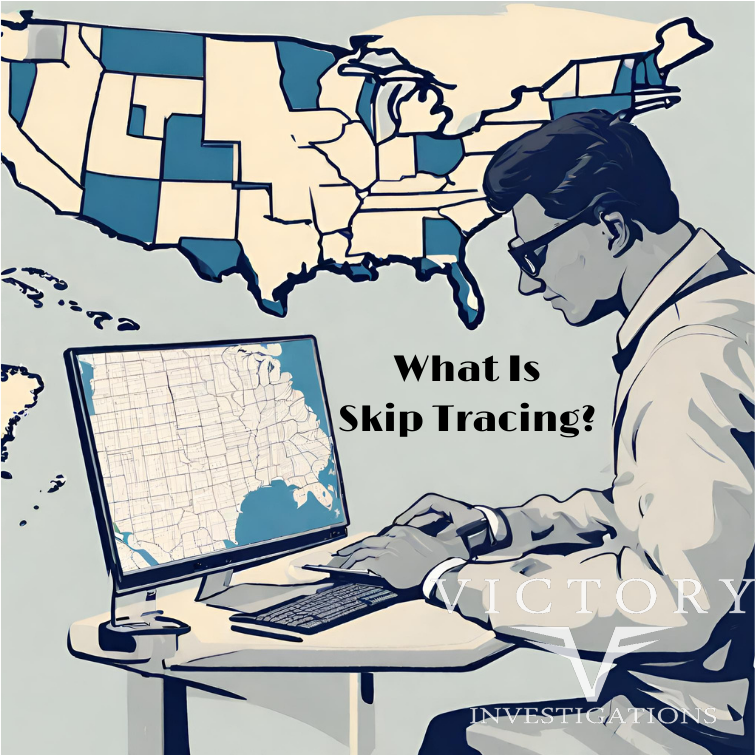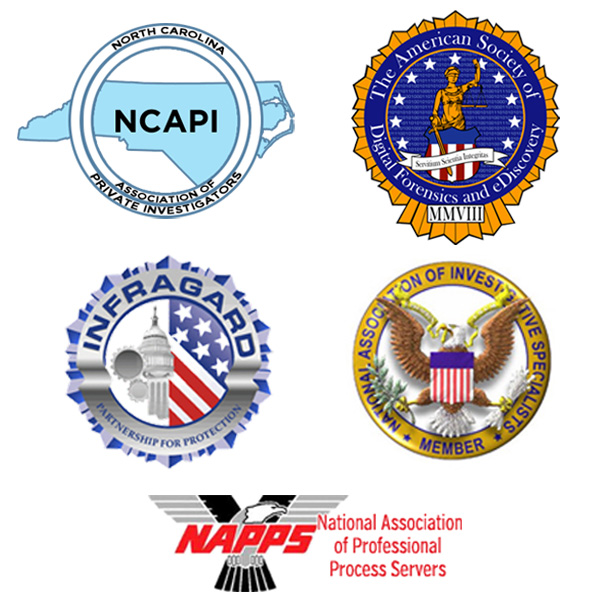If you’ve ever owned a business, been a landlord, a freelance service provider or you’re an attorney, you’ve probably had a client or tenant that has refused to pay for the goods and services you’ve provided them. So, you do what you think you should and that is to reach out to the person, in an attempt to remind them of what they owe you. Perhaps they’ve overlooked the invoice or maybe they’re just ignoring you. You’ve tried numerous times to contact them, using the information they provided you, and have failed over and over. When you’ve exhausted, what you believe to be every option available to you, and it has become increasingly clear that this person is avoiding you and payment, it may be time to call in some reinforcements – the Skip Tracer.

What is Skip Tracing?
Skip tracing is the process or practice of tracking down a person or persons whom are unresponsive, missing, or very hard to find. Skip tracing is an investigatory course of action that is commonly used to pinpoint an individual’s whereabouts and/ or workplace. It is usually used as a last resort in trying to make contact with debtors for unpaid debts, witnesses, or even long-lost relatives or other contacts. The person who attempts to locate people that are hard to find or attempting to avoid being located is known as a skip tracer.
The noun “Skip” is jargon for someone that has “skipped town”, which basically means to leave from a place hastily, leaving as few clues as possible as to where they went. Trace or “Tracing” is the act of tracking down the contact information and/ or whereabouts of the person of interest.
Who uses Skip Tracing Services or Skip Tracers?
In short, anyone that needs or wants to locate a person of interest. In addition to debtors or witnesses, clients have asked us to find relatives, whom they’ve lost contact with or perhaps an old college roommate or maybe a person with whom they had served in the military. And even people that have passed away… That’s right, we have found loved ones, for family members, that were looking for where either the decedent last lived or are now buried.
Other’s that hire Skip tracers, regularly, are:
Banks and financial institutions
Repossession agents
Collection agencies
Tenant verification services
Bail bondsmen
Genealogists
Journalists
Credit card companies
Lawyers and paralegals
Insurance adjustors or investigators
Private investigators (many of which perform skip tracing services themselves)
Sworn Law enforcement officers or detectives
Process servers (for purposes of serving legal documents i.e. Summons & Complaint, Subpoena, or even important letters that need to be hand delivered)
Real estate agencies, agents, and brokers
Landlords
How Does Skip Tracing Work?
The process often begins with collecting basic information about the Subject, such as their last known address, phone number, or workplace. Verifying the outdated data is a best practice and first step in attempting to locate any person or skip. We have also found that skips know what they plan to do, well in advance of doing them. Often they’ll provide a mixture of real and accurate information with completely made up information. The skip tracer can identify this and will hopefully replace the old and inaccurate information with current and true details about the skip.
Skip tracers leverage a range of tools and proprietary databases, including public records, social media platforms, and credit report information (credit headers), to gather clues about the person’s current location. They may also interview friends, family members, and acquaintances to obtain leads. Advanced skip tracing techniques involve data analysis and pattern recognition to predict where the individual might be based on their past behaviors and connections.
These tools, techniques and databases can reveal A LOT of information, such as:
Address history
Current & past property records
Court records
Credit header data
Criminal records
Federal court records
Civil records
Driver’s license history
Current and past vehicle information
Vehicle sightings
Employment history
Phone numbers
Property tax records
Utility information
Social Media
Deep web data (it is believed that the Deep Web curates 80% of the internet – only accessible through specialized tools and techniques)
Contact Friends & Family (this is really one of the last resorts to employ – we do not want our skip to be tipped off to our efforts, if we can help it.)
The data obtained by the skip tracer from the aforementioned records and resources might be sufficient for locating the individual. However, if it proves insufficient, the tracer often reaches out to the skip’s friends and family. In the event that the person has relocated, it is likely that they shared details about their departure and future whereabouts with close associates. These individuals may offer the skip tracer valuable information aiding in the location process. It is essential to note that if the skip’s relatives and friends are unwilling to provide information, an ethical skip tracer refrains from using intimidation or coercion. Instead, a skilled skip tracer relies on refined persuasive skills (Social Engineering), recognizing that cooperative efforts are in everyone’s best interest for the individual to be located amicably.
What is Batch Skip Tracing?
Batch skip tracing is usually used by real estate companies, real estate agents, and investors to gather basic contact information of multiple people, at once (bulk), for business to business (B2B) purposes. It is also used to uncover contact information for the true owners of a given property. Many properties are rented and the client would like to know the real owners name and contact information. Also, the target properties are sometimes owned by a company and the client would like to know who owns the company or who runs the day to day operations of the company. This may include phone numbers, email addresses, mailing address, etc. Append Services attempt to match particular data sets with other data and characteristics. In theory, this technique provides a more accurate result, based on the criteria of the client (real estate company or agent). In simple terms, this service will acquire the information needed to contact targeted groups of people – real estate buyers, sellers, and investors. However, this type of service often gets things wrong and the data provided can be misconstrued or cross-contaminated with inaccurate data. Batch skip tracing is cheaper and as a result, be prepared for the data to be no more than 40-50% accurate.
What is the difference between a Bounty Hunter or Bail Bondsman and a Skip Tracer?
Many people associate skip tracing with bounty hunting. Of course they both have similar objectives – locating their Subject (and usually one that does NOT want to be found). But more often than not, bounty hunters, themselves, turn to private investigators or professional skip tracers to locate fugitives that have failed to appear as promised. These fugitives have “skipped” on their bail. With that said, bounty hunters can often perform skip tracing for their own purposes, but typically, skip tracers are NOT bounty hunters.
The job of the bounty hunter is to find criminals who are “on the lam” to avoid going to jail. This is when they’ll normally contact and hire a skip tracer to obtain information that can aid in the location and apprehension of the fugitive. Skip tracers can be employed to track down subject matter experts, witnesses, missing persons, long-lost relatives, and more.
Why Skip Tracing is Considered a Vital Service?
Skip tracing extends beyond apprehending criminals and debtors. There are literally dozens of reason why a person or an entity would want to locate someone or multiple people. I’ve listed some below:
1. Job Applicant Evaluation:
Recruiters and hiring managers may employ skip tracers to conduct identity verifications and criminal background checks on job applicants, ensuring the authenticity and accuracy of the information provided by an applicant. We have also provided post-employment background checks, when an employer failed to proactively conduct one at hire. These are normally performed due to a disgruntled employee that has made threats to upper management, co-workers, or the facility, itself.
2. Legal Case Assistance:
Professionals such as lawyers, journalists, law enforcement agents, and private investigators can utilize skip tracing services to locate individuals involved in criminal investigations or civil lawsuits, either as witnesses or persons of interest. We are often retained to obtain contact information for witnesses. Sometimes, we are asked to interview the witnesses, we locate, as an add-on service.
3. Finding Family and Friends or Past Classmates:
Skip tracing aids individuals in locating missing relatives, friends, or those with whom they’ve lost contact. Common cases involve reconnecting with friends and family over the years, childhood or college friends, adopted individuals seeking to connect with their biological parents, and locating missing parents or spouses due to various circumstances.
4. Real Estate Transactions:
Real estate agents and investors leverage skip tracing to identify potential sellers and buyers. By tracing property owners, they build prospect portfolios, facilitating business expansion and deal closures. This batch tracing service is not very accurate. We suggest smaller scale searches to ensure quality over quantity.
5. Debtor Tracking:
Debt collectors employ skip tracers to locate debtors for the collection of owed funds. This includes tenants with outstanding rent or property damage, employees involved in fraud, embezzlement, or violations of non-disclosures (NDAs), employee theft (potentially company proprietary information and secrets); clients indebted to a business, contractors who abandoned projects, and landlords (some real and some that pose as landlords) who vanished after receiving money from potential tenants. Skip tracers will locate these persons for purposes of serving process – hand delivering legal documents and actions. Skip tracers normally hand the locations over to a private process server or private investigator to effect service on the debtor.
6. Locating Court No-Shows or bail/bond skips:
Bounty hunters tasked with apprehending individuals who fail to appear in court may enlist skip tracers or private investigators to track down the fugitive. Once a location has been confirmed, bail agents will attempt to apprehend the criminal.
7. Locating Military Members or People that served, together, in the past:
Private investigators and skip tracers are sometimes asked to locate a member of the military that the client knows, personally. Some people are looking for old friends and colleagues that they served with, while in the military.
8. Locating deceased person’s last known whereabouts or burial sites:
We, as private investigators and professional skip tracers have been asked to research people that have passed away. Some of the reason for this is that the client or family member may not know where the deceased is buried or their circumstances at the time of their death. Sometimes we are asked to track someone down, and in the process, discover that the person has passed away. This sort of information could prove vital for an ongoing case. Helping a family member find the gravesite of a loved one is particularly rewarding.
9. Finding a contractor that has disappeared:
We get this one a lot. A client hires a contractor to do a job and they don’t complete it, after being paid upfront for their service and material. We’ve had some contractors that had taken the client’s money and never even began the work. Obviously, people should not pay for a job that has not been completed. Often, the best one can do is to have a private investigator research the service provider, upfront, and see if there any red flags. But also, only pay for material upfront and perhaps pay the labor each day that the contractor shows up. Almost every time we take on a skip trace like this, we find that the contractor had done the same thing to numerous people.
10. Adoption and biological parent location and locating heirs:
There are private investigators, skip tracers, and genealogists that specialize in this type of locating. We have looked for heirs many times over the years. Most of the time the persons we are locating and ultimately have found, had no idea they were even considered in a will or named as a beneficiary of a life insurance policy.
Can anyone skip trace or locate someone?
Absolutely! However, it takes years of experience to become really good at locating people, especially those that don’t want to be found. People that don’t want to be located usually work just as hard at hiding their whereabouts, as you will to try to find them. This can prove to be very frustrating, as you to hit wall after wall. The information available to the general public can be very good or it can be very stale and/ or heavily cross-contaminated. Resources that can be found online are wrought with inaccurate information. Believe me, we’ve tested it. It’s not unusual for these providers to give you information that is several years old. And if you’re trying to find someone with a common name, be ready to sift-through all the persons that share the same name as the person you’re looking for. Trying to match up addresses, emails, phone numbers, criminal records and more to the “John Smith” you’re looking for is going to drive you a little mad. I say all of that to say this, it is probably best to leave the skip tracing to the skip tracing professionals. If you do find yourself taking on the task and hitting dead ends, you might want to consider hiring a skip tracer or private investigator to finish the job. You’ve heard what I have to say about taking on the task yourself. But, if you’re hard headed (no fret, I am too) and still want to give skip tracing a go, I am giving you some resources, below, to begin your quest. Don’t get upset when you fail. After all, that’s how we all learn some of our most important lessons. But, if you do find yourself not really gaining traction, give us a call. We’ll be glad to assist you in your search.
Where Do Skip Tracers and Private Investigators get their information?
We’ve alluded to a few of these resources before and many of these are mentioned in other articles we have written. Licensed private investigators and professional skip tracers may (most do) have access to databases that the general public does not have access to. These database providers require credentialing to be provided, by the private investigator or skip tracer, before they allow access to their data. This is because some of the information they provide is considered sensitive and is regulated by local, state, and federal laws, such as the Gramm-Leach-Bliley Act (GLB) and the Driver Privacy Protection Act (DPPA). Also, these databases are subscription based and skip tracers can rack up a significant cost, while researching their skips. This is one of the reasons why skip tracers charge a premium for their services. And remember, you’re also paying for the years of experience and the war chest of knowledge the skip tracer has. There’s an excellent quote about why one should not skimp on professional services. It goes like this: “If you think it’s expensive to hire a professional to do the job, wait until you hire an amateur”. In other words, you get what you pay for. In addition to the paid resources skip tracers use, they are well versed in OSINT or Open Source Intelligence. This includes every open source of information imaginable, including public records, such as arrest records, social media, business filings, property records, employment and marriage information, and sometimes even scouring the deep and dark webs.
What are the best resources for locating people, without having access to a paid database?
You’ve heard the phrase “Google it”. Well, it should come as no surprise that Google has most of the world’s market share when it comes to online search queries. I believe Google is used for literally 80%-85% of all searches worldwide. Regardless of the Mega-giant’s search popularity, there are dozens of free resources for open source information, many of which you may not have heard of. With that said, Google does have a fantastic library of images, so don’t just rely on results comprising of just text or documents. Images, reverse image searches and video can help when attempting to locate someone.
BeenVerified, People Finder, TruthFinder, and the like…
These type of websites typically have some upfront, free information and then promise more detailed results behind a pay wall. The information these services provide is oftentimes outdated and horribly cross-contaminated. Cross-contamination, for example, is when results show that the John Smith you are looking for includes addresses, phone numbers, emails, etc. that actually belong to another John Smith. Look, even paid database contain some of this. The difference is when you’ve hired a professional skip tracer or private investigator, they will attempt to validate their results. Now don’t get me wrong… These machine powered information providers can provide some great nuggets of information. You just have to try and figure out which nuggets are true and which ones are old or may be associated with another person.
Social Media
Social media sites are a wealth of great information. People literally cannot wait to talk about themselves, their activities, and friends. There are very powerful ways to leverage search within social media platforms and every one of them are a bit unique in functionality. And don’t just consider the most popular ones when looking for someone. We all have different tastes and there are a ton of social media platforms to look through. Some of the social sites that are not often regarded as “search engines” are: LinkedIn, Pinterest, TikTok, YouTube and more. More ways for people to connect are developed every year. Threads (Facebook’s answer to Twitter/X) was just launched in 2023 and already has over 160 million users. Again, knowing how to properly search these sites is the key to success.
Genealogy Websites and Archive Sites Everyone has heard of Ancestory.com, but have you heard of the Wayback Machine (web.archive.com) or FindAGrave.com? We use sites, like these, regularly for familial connections and regional pointers. The Wayback Machine archives past versions of websites and web pages, going back as far as 1996! Now, that’s a powerful tool. Don’t forget about obituaries. We find ourselves reading a lot of obituaries to link people together.
When Should You Hire a Skip Tracer?
Only you can truly answer this question. But generally speaking, if you’ve tried and failed to locate the person, you may want to consider reaching out to a professional. Maybe time is of the essence and you need the information as quickly as possible. In that case, you should forego doing the research yourself and hand the task directly over to a skip tracer or private investigator. If you don’t have the money, but have a lot of time on your hands, then perhaps you should try locating the person on your own. You never know, you may just hit pay dirt and quickly. Skip tracers will usually know exactly where to begin their research and the best strategy to employ. They develop a plan of action based on the already known data and attack the task vigorously… Time is money. One thing you don’t want to do is put yourself in a position where you might be accused of stalking. If the person you’re looking for is hiding from you specifically and intentionally, you are on their radar. You may want to reconsider a “boots on the ground” approach, if you find that the person is nearby. Instead, hire a private investigator to perform some surveillance to confirm your information. If you are trying to serve the person with a legal action, the private investigator can do that as well. When a trail grows cold, a skip tracer may reach out to friends and family for information. As mentioned earlier, this should be a last resort or near last resort, as friends and family try to protect the one you seek, by giving false information and notifying the skip of your efforts.
How Much Does Skip Tracing Cost?
Ha! That’s a loaded question. Every professional charges what they believe their time and efforts are worth. They also take into consideration the costs of their paid databases. The costs can vary greatly, depending on difficulty and other factors, but you can expect to pay anywhere between $250 and $500 for locates that don’t take a lot of time or resources. The more difficult and advanced research may be billed at an hourly rate. These can range between $85 per hour to $200 per hour and some professionals may require a retainer or deposit. This can also depend on where in the world the services are contracted. Since skip tracing doesn’t usually require that the skip tracer to be in the same state as you, so feel free to shop around. But remember, You Get What You Pay For.
Frequently Asked Questions (FAQs) About Skip Tracing:
How Long Does it Take To Skip Trace Someone?
This too can vary, depending on the difficulty. The difficulty depends on how much and what sort of information is already known. It can be more difficult if the Subject of the skip trace has just “skipped” or left town. Common names with lack of other identifying information can make the skip trace more difficult thus taking more time. As a general rule, you can expect a properly conducted skip trace to take between 1 to 2 weeks. It could take longer, particularly if the skip tracer has several locates going at once.
Is it Legal to Skip Trace Someone in the US?
In short, Yes. But be aware that it is illegal to use methods such as coercion or threats to obtain information. It is also illegal to use a “pretext” to obtain financial information. It can also be illegal to share certain information, which is deemed sensitive, and violates the Gramm-Leach-Bliley Act (GLBA) and/ or the Driver Privacy Protection Act (DPPA). There are other protections against using information, derived from public records, to make employment eligibility decisions.
How Do I Find A Skip Tracer Near Me?
That’s an easy one! A skip tracer does not have to be near you to assist you. Simply call Victory Investigations at 1-888-482-6273 and we will be happy to help. We provide skip tracing, hard locates, asset searches, and more all over the United States. Not only do we have the skills and experience, we also have access to many proprietary databases that we’ve mentioned previously.





Speak Your Mind